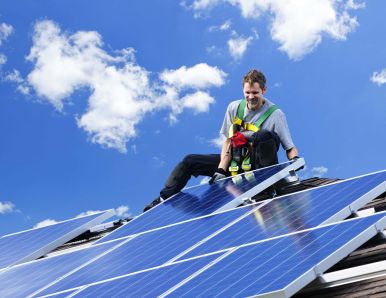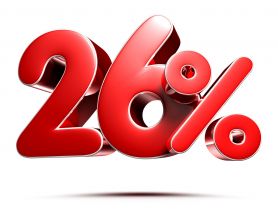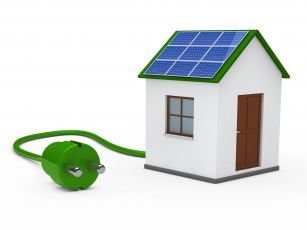Best Solar Panels for Home Use New Jersey
Solar panels are one of the best ways to reduce your carbon footprint and save money long-term. But which solar panels? We’ll take a look at some of the most popular models out there.
What are the best solar panels for home use?

Solar panels are one of the best ways to reduce your carbon footprint and save money long-term. But which solar panels? There are many different models to consider, the following are some of the most popular types:
Monocrystalline solar panels:
These are the most efficient. They’re composed of many silicon cells, which are created by slicing cylindrical ingots into wafers. Silicon is relatively cheap and abundant but requires extremely pure material to achieve high-efficiency ratings. This means that monocrystalline solar panels are usually the most expensive.
Polycrystalline solar panels
These are less efficient but more common and usually less expensive than monocrystalline solar panels. They’re composed of many silicon cells, which are created by melting silicon pellets under a high temperature and then rapidly cooling them down to form polysilicon crystals. It’s a cheaper process than creating monocrystalline cells, but it results in a slightly-less efficient panel.
Thin-film solar panels
Instead of requiring silicon, these panels are composed of semiconductor materials that are much thinner and lighter than traditional solar panels. They’re also less efficient, but they don’t require nearly as expensive an upfront investment to install.
How to choose the best solar panels for your home
When it comes to choosing the best solar panel for your home, there are many things that you need to take into account. You will want to decide what you are going to use the solar panels for, how much space you have on your roof, what areas of the country you live in, and more.
Consider solar panel efficiency
Efficiency will play a massive role in the panel’s choice. You should consider which type of solar panel is more efficient for your needs, which will help you make better decisions on what to buy. When it comes to efficiency, there are two main types: crystalline silicon and thin-film panels. The most efficient solar panels around are crystalline silicon, but thin-film is much cheaper.
Solar panel efficiency is measured in Watts per square meter, and the most efficient crystalline silicon panels can reach up to 22% efficiency. Thin-film solar panels are around 15%.
Compare price and efficiency.
It is crucial to consider the current prices of different types of solar panels and how efficiently they will work for you. Crystalline silicon panels are the most efficient, but thin-film panels are much cheaper. However, crystalline panels will last longer than thin-film.
Many experts recommend using both types of solar panels to help maximize efficiency and control costs. While one type may be the most efficient in the current market, that can change rapidly. It would be best to consider all aspects of your home solar system to ensure that it will suit your needs.
How to find the top solar panels companies
To find the top solar panels companies, you can run a price comparison search on Google. You might also look for reviews about your desired company in order to determine how reliable and trustworthy they are.
There are numerous solar panel manufacturers that you can choose from. To find the best one for your needs, consider:
• The company’s reputation and reviews online
• What products they offer in terms of solar panels
• The company’s location and how long they have been in business.
Solar panel installation companies
The solar panel installation companies that you can choose from are also numerous. To find the best one for your needs, consider:
• The company’s reputation and reviews online
• What products they offer in terms of solar panels
• The company’s location and how long they have been in business.
Financing options
There are many options out there when it comes to financing. One of the best is to get a loan. There are also other financing options like leasing or paying off an install in installments. Loans are available through banks or credit unions. Some companies offer a lease or a power purchase agreement (PPA). A power purchase agreement is where you pay for the installation, but the installer owns the solar panel system. With a PPA, you pay a fixed rate that is usually lower than the local utility’s retail rate. It’s a good option for those who don’t have thousands of dollars laying around to purchase an installation upfront.
Comparison of solar financing options
Home equity loan or second mortgage:
Homeowners who want to save money, protect the environment, and feel a sense of pride by going solar often find that a home equity loan or second mortgage is a good financing option.
When you’re looking at solar financing alternatives, you may hear solar companies use the term “secured” to describe a home equity loan – which implies that the lender needs some form of property as collateral for the money they lend. In most cases, this means a lien on your house is required and the lender has the right to seize your property if you default on your mortgage.
Solar loan:
A solar loan is a type of financing in which you borrow money to finance the purchase of a solar energy system and pay it off over time. Unlike with solar leasing or a PPA, you own the system outright, allowing you to take advantage of tax benefits.
Solar Power Purchase Agreement:
This is a good and affordable option for those with equity in their homes and can’t fund the system at one time to put down the cost altogether. A company will rent the installation to you. Usually, you pay a monthly amount for this type of agreement until the system is paid off. It’s like paying an electric bill but instead, you send your money to the solar company.

Tax credits and rebates:
Solar energy installations are often eligible for tax credits or rebates in many locations. Solar power is a great way to lower your energy costs and reduce carbon emissions at the same time. In addition, the federal government provides a 26 percent rebate on all installed systems in 2020-2022 and 22 percent for systems installed in 2023.
Home compatibility with solar energy
You might be surprised to think that not all homes are good candidates for solar. Many things can make your house more or less compatible with solar energy systems. If you already have an electric bill, the main thing you want to think about is how big of a system you need since it will determine what size installation and how much money you might save.
It would be better to look at what appliances you use the most and figure out how much energy they use. Knowing what appliances will be on when you are producing energy can help you size your system. Solar companies should be able to provide you with the best estimate for your area.
Solar Incentives
In recent years, the federal government has been offering tax credits for installing a home solar system. This includes both residential and commercial use. Solar installation can be expensive, but these incentives ease some of that burden by giving you a discount on your taxes. To qualify, you typically need to have a sizable installation and prove it with some official documentation.
The federal government plans to increase the number of people who can get tax credits on solar systems through 2022 and beyond. You can find out more by contacting your local clean energy organization or environmental agency. Different states also offer their incentives, so it is worth looking into what your state might provide.
Pros and Cons of Solar Panels

Advantages of Solar Panels
- Solar panels work by generating electricity from the sun’s natural energy. They can reduce or eliminate your electric bill.
- They are a good investment since they increase the value of your home.
- They are better for the environment because all of the electricity comes from renewable sources.
Disadvantages of Solar Panels
- The expense of putting solar panels in place may be costly, so you’ll want to keep things in mind for the long run.
- It takes a long time to install solar panels; from the day you sign your contract with your installer, it will generally take between one and three months before your solar panels are connected to the electricity grid and produce energy for your home.
- Your home might not be a good candidate for solar panels if you live in an area with low sunlight or if the direction isn’t ideal.
Frequently Asked Questions
What solar cell technologies do the best solar panels use?
Solar panels made from monocrystalline silicon are generally more efficient than polycrystalline solar panels, and both perform better than thin-film solar panels. There are a variety of different solar panel brands available. Polycrystalline solar cells have the advantage of being less expensive to produce but may be less efficient.
How many solar panels are needed to run a house?
To completely offset utility expenses with solar, a typical house require between 20 and 25 solar panels but it also depends on a few factors, such as location and individual panel characteristics.
Are solar panels expensive?
The initial cost of installation is high, but purchasing and installing solar panels may save you money in the long term. You can save money by purchasing and putting up solar panels with federal tax credits and rebates. Furthermore, as time goes on, your solar panels will increase the value of your property.
How can I tell how much energy my solar panels are producing?
There are several ways to keep track of how many kilowatt-hours your home’s solar system produces. The simplest way is to use the digital display on the inverter (controller) that manages power. You can also track information online or with a mobile device.
What equipment do you need for solar panels?
In addition to the fiber panels, you’ll need an electrical outlet. Inverters turn DC power from the panel into AC power which appliances and gadgets can use in your home. It would be best if you also had wiring and other equipment to ensure everything was running smoothly.
